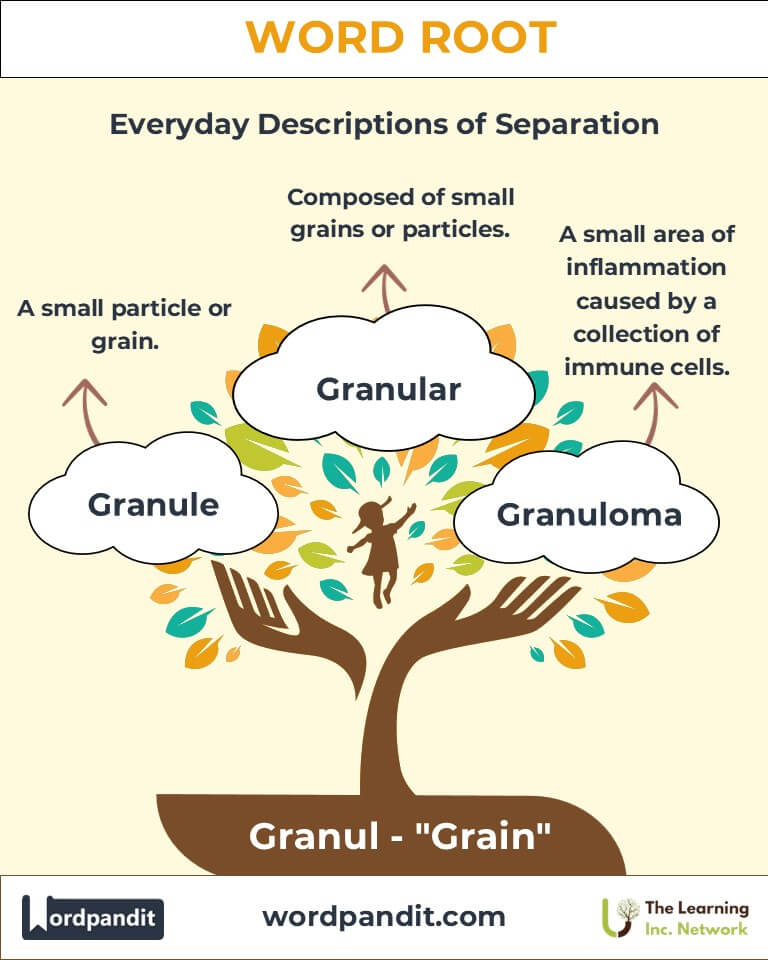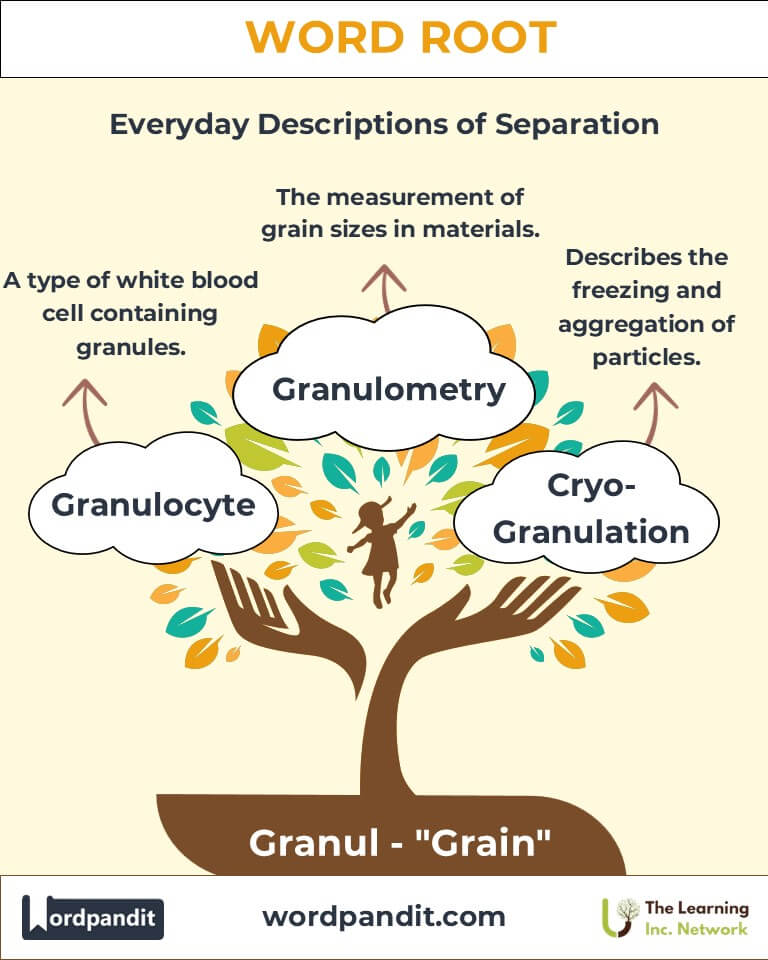Granul: The Root of Grain in Science and Language
Discover the significance of the word root "granul," derived from Latin meaning "grain." From granular substances to biological granules, this root enriches our understanding of the micro and macro aspects of our world.

Table of Contents
- Introduction: The Essence of "Granul"
- Etymology and Historical Journey
- Mnemonic: Unlocking the Power of Granul
- Common Granul-Related Terms
- Granul Through Time
- Granul in Specialized Fields
- Illustrative Story: Granul in Action
- Cultural Significance of the Granul Root
- The Granul Family Tree
- FAQs about the Granul Word Root
- Test Your Knowledge: Granul Mastery Quiz
- Conclusion: The Enduring Legacy of Granul
Introduction: The Essence of "Granul"
Think about sand, sugar, or even the intricate components of our cells—what ties them together is the concept of "grain." The root "granul" (pronounced gran-yool) signifies "grain" and is integral to describing minute particles or structures, whether physical or biological. From granular data to cell granules, this root finds applications in diverse fields like technology, biology, and everyday language.

Etymology and Historical Journey
The root "granul" originates from the Latin granulum, meaning "small grain." Over centuries, it has found its way into multiple languages and specialized vocabularies. During the Middle Ages, the term was used to describe granular materials in alchemy and medicine. With advancements in microscopy, "granul" became integral in describing cellular structures and processes.
Mnemonic: Unlocking the Power of Granul
Mnemonic Device: "Granul gathers grains into greatness, from sand to cells!"
Visualize a handful of sand, each tiny grain representing the essence of "granul"—small yet significant.
Common Granul-Related Terms
- Granule (gran-yool):
- Definition: A small particle or grain.
- Example: "The scientist observed granules in the cytoplasm under the microscope."
- Granular (gran-yuh-ler):
- Definition: Composed of small grains or particles.
- Example: "The surface of the planet appeared granular in the telescope images."
- Granulocyte (gran-yoo-loh-site):
- Definition: A type of white blood cell containing granules.
- Example: "Granulocytes play a crucial role in the immune response."
Granul Through Time
- Granular: In the 18th century, the term expanded from physical particles to metaphorical uses, such as granular details in analysis.
- Granuloma: Initially a medical term in the 19th century, its usage grew with the rise of immunology and pathology.
These terms reflect the evolution of "granul" from a simple descriptor to a cornerstone in scientific terminology.
- Granular: In the 18th century, the term expanded from physical particles to metaphorical uses, such as granular details in analysis.
- Granuloma: Initially a medical term in the 19th century, its usage grew with the rise of immunology and pathology.
These terms reflect the evolution of "granul" from a simple descriptor to a cornerstone in scientific terminology.
Granul in Specialized Fields
The root "granul" appears in various domains:
- Medicine:
- Granulocyte: Essential in diagnosing and understanding immune disorders.
Application: Granulocytes are studied in conditions like leukemia.
- Granulocyte: Essential in diagnosing and understanding immune disorders.
- Earth Sciences:
- Granulometry: Vital in soil science and geology.
Application: Used to classify sediments and predict soil behavior.
- Granulometry: Vital in soil science and geology.
- Technology:
- Granular Data: Refers to detailed and precise datasets.
Application: Granular data analysis drives insights in big data and AI.
- Granular Data: Refers to detailed and precise datasets.
Illustrative Story: Granul in Action
Dr. Elena, a soil scientist, faced a critical challenge: understanding why crops were failing in a rural region. Using granulometry, she identified that the soil lacked fine particles necessary for retaining water. Her granular analysis of the data led to targeted soil amendments, revitalizing the farmlands and transforming the community's agriculture. This story highlights how "granul" connects the minute with the monumental.
Cultural Significance of the Granul Root
The concept of "granul" resonates culturally through its metaphorical applications. Phrases like "granular detail" or "grain of truth" emphasize precision and small contributions to a larger whole. In traditional crafts like pottery, understanding granular compositions of clay has been essential for centuries.

The Granul Family Tree
- Grain (Old English): Refers to seeds or particles.
Example: "A grain of rice." - Corn (Latin: granum): Highlights the agricultural roots of "granul."
Example: "Corn granaries sustained civilizations." - Cryo-Granulation: A modern term describing the freezing and aggregation of particles.

FAQs about the Granul Word Root
Q1: What does "granul" mean?
The root "granul" comes from the Latin word granulum, meaning "small grain." It is used to describe structures, substances, or particles that resemble grains in size or texture.
Q2: What is a granule in biology?
A granule refers to a small particle within a cell, often containing enzymes or other substances. For example, lysosomal granules in immune cells store enzymes that help break down pathogens.
Q3: What are granulocytes?
Granulocytes are a type of white blood cell that contain granules filled with enzymes. These cells are essential for the immune system, helping to fight infections by releasing substances that kill or neutralize pathogens.
Q4: How does "granul" apply in soil science?
In soil science, "granul" appears in terms like "granulometry," which measures the size distribution of soil particles. Understanding this helps scientists analyze soil properties like water retention and fertility.
Q5: What does granular mean in everyday language?
"Granular" is used metaphorically to describe extreme detail or precision. For instance, when analyzing data, "a granular approach" means examining fine details rather than just the broad trends.
Q6: What is a granuloma in medicine?
A granuloma is a small area of inflammation caused by the accumulation of immune cells. It usually forms in response to infections like tuberculosis or chronic irritants, helping isolate harmful substances from healthy tissue.
Q7: How is granularity used in technology?
In technology, granularity refers to the level of detail or precision in data. For example, "granular data" provides specific insights at a detailed level, such as sales broken down by hour rather than just by day.
Test Your Knowledge: "granul" Mastery Quiz
1. What does the root "granul" signify?
2. Which term refers to measuring grain sizes?
3. What are granulocytes?
4. What is a granuloma?
5.How is "granular" used metaphorically?
Conclusion: The Enduring Legacy of Granul
The root "granul" connects us to the fundamental concept of grains, from the physical particles shaping our world to the metaphorical granularity that drives precise understanding. Whether in science, technology, or culture, "granul" underscores the power of the small to shape the big. Embrace this root to explore the intricate details that define our universe.














